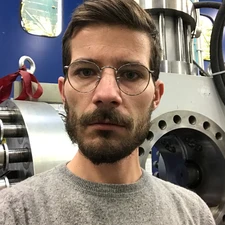Marco M. Scuderi

EMRP Earth Magnetism & Rock Physics
The 2018 Division Outstanding Early Career Scientist Award is awarded to Marco M. Scuderi for his exceptional seminal contributions to our understanding of fault mechanics and earthquake physics via important fundamental advances and high-quality papers on a broad range of problems on rock physics.
Marco Scuderi played a key role in the discovery of how to control the slip rate during stick-slip failure events and thereby reproduce in the laboratory the complete spectrum of slip behaviours observed for tectonic faults. There were numerous previous observations of slow slip and complex slip behaviours in laboratory experiments, but none of them showed the kind of repetitive stick-slip behaviour necessary to fully investigate the underlying mechanics. Scuderi’s work on precursory changes in seismic velocity during laboratory earthquakes is a ground-breaking contribution to our understanding of fault zone weakening prior to earthquake failure. Scuderi had to overcome a number of technical challenges and employ some cutting-edge signal processing techniques to see that there were clear, precursory changes in seismic wave speed before stick-slip events. His work has significant implications for seismic hazard assessment.
With his Marie Curie Individual Fellowship, Scuderi has developed unique laboratory experiments to document changes in the rate-and-state friction parameters of faults as a function of fluid pressure. On this research path, he has demonstrated that fault weakening induced by fluid pressurization can trigger a dynamic instability even in cases of velocity-strengthening friction, with invaluable insights to predict the seismic risk associated with injection-induced seismicity. Scuderi thinks deeply about science and the quality of his publications and talks (including many invited talks) demonstrate that he is a first-class researcher who works both quickly and with great care. These qualities make him an outstanding early career scientific leader of the highest rank today and with great promise for the future.
